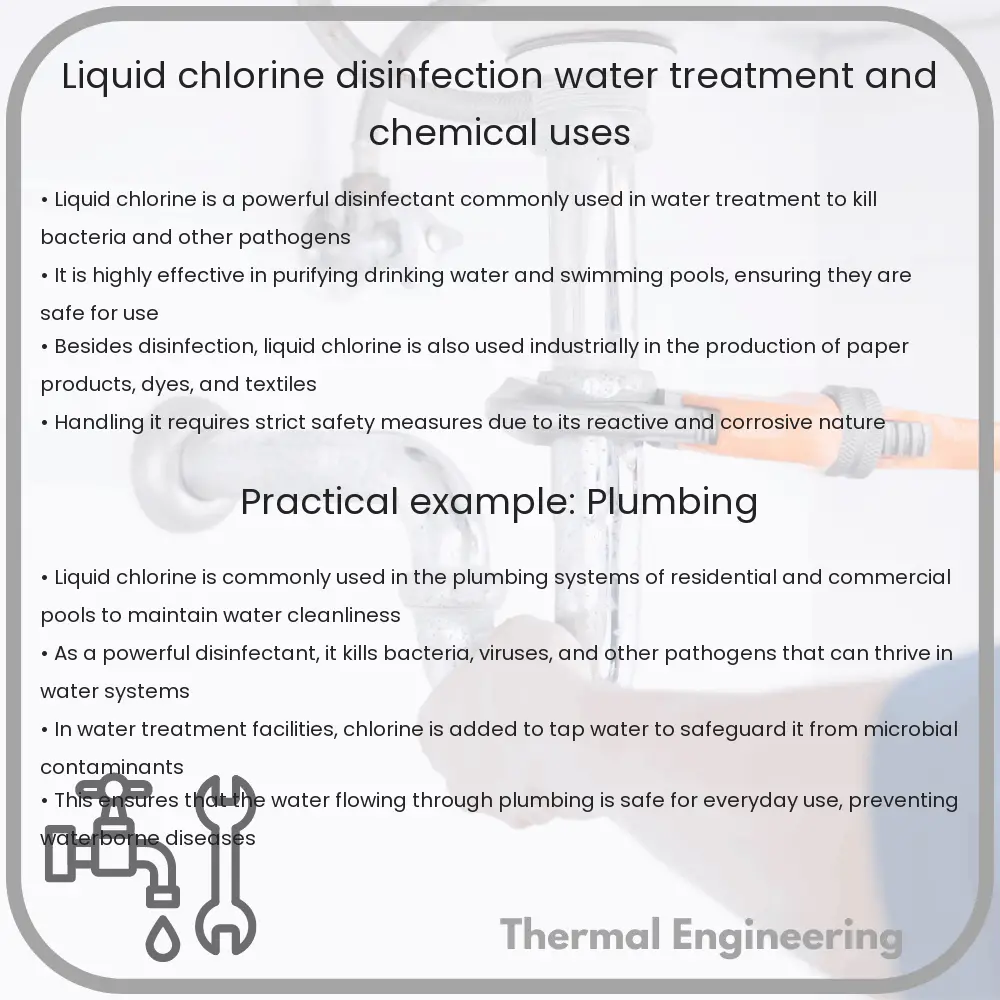Learn about liquid chlorine, its uses in disinfection, water treatment, and safety measures for handling this potent chemical.

Understanding Liquid Chlorine: A Versatile Chemical in Disinfection and Water Treatment
Liquid chlorine, often referred to by its chemical name chlorine (Cl2), is a highly effective disinfectant and sanitizer used across various industries. Its primary use is in water treatment processes to ensure the safety and cleanliness of water for public consumption. Besides its essential role in disinfection, liquid chlorine is also used in numerous chemical processes due to its strong oxidizing properties.
Properties of Liquid Chlorine
Liquid chlorine is a yellow-green gas under atmospheric conditions but can be pressurized and cooled to transform into a liquid. It is highly reactive and particularly effective at killing bacteria, viruses, and other microorganisms. It operates by breaking the chemical bonds within the cell walls of microbes, leading to their destruction.
Disinfection through Liquid Chlorine
In the context of disinfection, liquid chlorine is used to treat drinking water, swimming pools, and wastewater. When added to water, chlorine reacts to form hypochlorous acid (HOCl), a potent disinfectant:
- Cl2 + H2O → HOCl + HCl
This reaction is crucial for sanitizing water and making it safe for human consumption by eliminating pathogens that can cause diseases like cholera, dysentery, and typhoid. In swimming pools, chlorine ensures hygienic water conditions, mitigating the risk of waterborne illnesses.
Water Treatment Applications
Beyond disinfection, liquid chlorine plays a pivotal role in the broader scope of water treatment, which includes:
- Algae control: Chlorine helps control algae growth, preventing the clogging of water filters and pipes.
- Odor and taste improvement: By destroying sulfur compounds and other substances, chlorine improves the taste and smell of water.
- Chemical residue management: Chlorine neutralizes harmful chemical residues, such as pesticides and industrial waste, that may be present in the water.
Chemical Industry Uses
Liquid chlorine is not limited to disinfection and water treatment; it is also crucial in various chemical production processes:
- Manufacture of PVC: Chlorine is a key component in the production of polyvinyl chloride, a versatile plastic used globally.
- Production of solvents and cleaning agents: Many industrial cleaning products contain chlorine due to its strong oxidizing properties.
- Use in pesticides: Chlorine-based compounds are commonly used in the synthesis of pesticides.
Handling and Safety Considerations
Despite its benefits, liquid chlorine must be handled with care. It is toxic and can cause severe health issues upon exposure. Safety measures in handling liquid chlorine include:
- Use of protective gear: Workers should wear appropriate safety equipment such as gloves, goggles, and masks.
- Proper ventilation: Handling of chlorine should occur in well-ventilated areas to prevent the accumulation of gases.
- Emergency preparedness: Facilities using chlorine should have emergency procedures in place to address potential leaks or spills.
In conclusion, liquid chlorine is a powerful chemical with widespread application in disinfection and water treatment. Its effective use has significantly contributed to public health by providing clean, safe drinking water and hygienic swimming conditions. However, the handling of chlorine requires strict adherence to safety protocols to avoid hazards associated with its use.